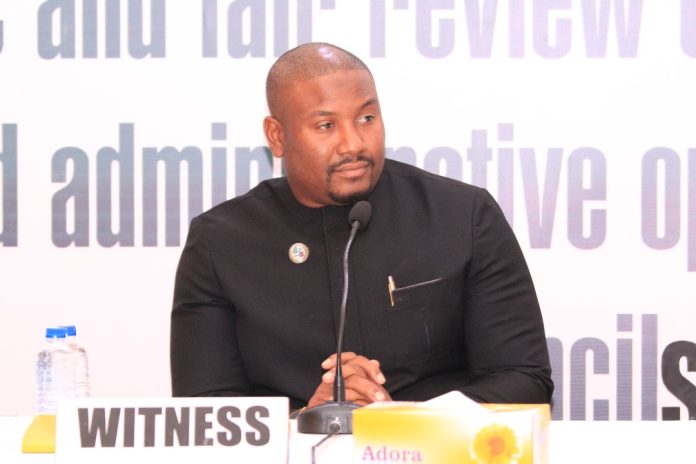By Yankuba Jallow
Mayor Talib Ahmed Bensouda of the Kanifing Municipal Council appeared before the Local Government Commission of Inquiry on Wednesday, August 27, 2025, where he was pressed by Lead Counsel Patrick Gomez over procurement procedures, council finances, and what he repeatedly described as “administrative lapses.”
Gomez continued to ask the witness about some payments made by the council.One such voucher, number PV210985, reflected a payment of 235,800 Dalasi to Councillor Kemo Bojang for the purchase of football goal posts and nets for four municipal fields.
“Please have a look at this voucher. The request is attached, and also a list of itemized expenditures,” Gomez told Bensouda.
“Yes,” Bensouda replied.
“Do you recognize that voucher?” the Counsel asked. Mr. Bensouda replied: “Not the voucher, but the request.”
When pressed, the Mayor confirmed that he had approved the request. “To the Lord Mayor, a request for goal posts and nets. I write a request for the purchase of goal posts and nets for Bakoteh, Tallinding, Charles Jaw and Kotu Quarry. Nets from No. 1 Sports Shop cost D9,500 for two. The total amount for this phase is D235,000, counting on your usual support and approval,” he read from the document.
The Counsel then probed whether proper retirement of funds had been carried out.
“Retirement? I will have to find out from the Ministry,” the Mayor responded, acknowledging that the procedure was unclear. The line of questioning quickly moved to whether such payments were classified as imprest or fell under regular procurement procedures. “In my opinion, I don’t think it should be an imprest because it’s a request for the purchase of items,” Mr. Bensouda said.
But when asked about the legality of such direct payments to Councillor Kemo Bojang, the Mayor drew a firm line. “I have checked, I am not a competent authority to determine legality of matters. I think the competent authority is other bodies like the courts or committees. So it would be not appropriate for me to respond on legality of issues.”
Still, he conceded that lapses existed. “You can say it’s an administrative lapse,” he told the Commission. When asked to explain further, he said, “CEO is the accounting officer of council. He should procure the materials.”
“So where is the administrative lapse?” Gomez asked.
“Like I said, I’m not the competent authority. That’s why we have the contracts committee. We have the procurement committees,” Bensouda replied.
The Counsel pressed harder, challenging the Mayor on inconsistencies between his reasoning and his actions in other council matters. At one point, a comparison was drawn to his handling of an alleged confession by a senior official. Mr. Gomez argued that the Mayor had acted on what he called a confession before any court ruling. Bensouda insisted: “My understanding on confession is not on law. My understanding on confession is when somebody decides to say whether they’ve done something or not. If I send that confession in my layman terms to the court of law, the court of law presumes Sainabou innocent until proven guilty. So that’s why I said I am not the competent authority.”
Throughout the hearing, a central theme was whether the Council, under the Mayor’s leadership, had complied with the financial manual and statutory obligations, particularly on the classification of grants and donations as revenue.
“When you did not classify grants as being part of revenue, when the Act clearly states that grants and donations are part of council’s revenue, you agree with me now, right?” Mr. Gomez asked. The Mayor conceded: “At that point, I answered you. I said yes, it is a lapse.”
The exchanges grew more pointed when Mr. Gomez emphasized that the law was explicit.
“When you read in the Finance and Audit Act that it says what the revenues of council are and it classified the revenues of council, would you not understand that?”
Mr. Bensouda maintained that even clear statutory provisions required external oversight.
“I always need legal advice on law. I am not a judge. I am not at a court of law. That’s why I was trying to correct myself and correct my statement. I cannot make judgments on legality or not. It would be wrong for me to do that.”
The Counsel countered that the Mayor had a personal duty to familiarise himself with the laws that govern his office.
“Is it a requirement that it must be brought to your attention or are you mandated by law, the office you occupy, to acquaint yourself with regulations?” he asked. The Mayor replied, “Both.”
The inquiry also touched on the oversight roles of the Ministry of Local Government, the National Audit Office, and other state organs. Citing Section 150 of the Local Government Act, the Mayor explained that ministries and regulators were mandated to inspect councils and ensure compliance.
“So to answer your question, yes, it is in law. That’s why I said both, that we should follow the law, but also have bodies to ensure we are complying with the law.”
In the end, Mr. Bensouda repeatedly circled back to his central defense: he was not the competent authority to determine questions of legality or violations. “What I can say is whether facts are as I see them or they are not as I see them,” he said. “Based on my knowledge of what has happened or what has not happened.”



















